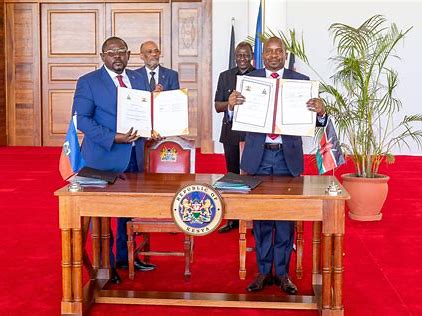Ruto said he and Haitian Prime Minister Ariel Henry had “discussed the next steps to enable the fast-tracking of the deployment”, but it was not immediately clear whether the agreement would counter a court ruling in January that branded the deployment “unconstitutional”.
Kenya, Haiti Sign ‘Reciprocal’ Agreement Allowing Police Deployment, President Ruto Says


Kenya and Haiti signed a “reciprocal” agreement on Friday to deploy police from the African country to lead a United Nations-backed mission aimed at tackling gang violence in the Caribbean nation, Kenyan President William Ruto said.
Ruto said Friday that he and Haitian Prime Minister Ariel Henry had “discussed the next steps to enable the fast-tracking of the deployment”, but it was not immediately clear whether the agreement would counter a court ruling in January that branded the deployment “illegal”.
Kenya had previously said that it was ready to send up to 1,000 personnel to lead the mission to Haiti, an offer welcomed by the United States and other nations that had ruled out putting their own forces on the ground.
But Kenya’s High Court ruled the deployment, initially expected by January, unconstitutional – in part because the two countries had not signed a reciprocal agreement on the issue.
That has effectively placed the entire mission on hold, even as the US and Canada have pledged hundreds of millions of dollars to it, and some countries have committed armed personnel.
On Friday, Ruto said in a statement that he and Henry had “witnessed the signing” of a reciprocal agreement in Kenya’s capital Nairobi.
“I take this opportunity to reiterate Kenya’s commitment to contribute to the success of this multi-national mission. We believe this is a historic duty because peace in Haiti is good for the world as a whole,” the Kenyan leader said.
Haiti, where gangs control most of the capital and nearly 5,000 people were killed in the violence last year, requested international help in 2022 as the violence surged but could not find a country willing to lead a mission.
The UN Security Council approved the mission in early October but concerns in Kenya over the country’s involvement prompted a court challenge.
Kenyan opposition politician Ekuru Aukot, who had filed the High Court petition against the deployment, said in a post on X (formerly Twitter) that Henry has no constitutional or legal powers to commit Haiti to any agreements with Kenya.
Friday’s deal was signed as the Haitian capital Port-au-Prince was racked by deadly gang-related violence, forcing flight cancellations and the closure of schools and businesses.
Armed clashes involving gangs, police, and vigilantes rocked Port-au-Prince on Thursday in what a prominent gang leader said was a demonstration against the authorities.
Gang leader Jimmy Cherisier, known as “Barbecue”, said multiple factions were parlaying to launch attacks on state security forces in a bid to remove Prime Minister Henry. He publicised the attack in a social media video just before the battles began.
“With our guns and with the Haitian people, we will free the country,” he said.
Haiti, the Western hemisphere’s poorest nation, has been in turmoil for years, with armed gangs taking over parts of the country and unleashing brutal violence, leaving the economy and public health system in tatters.

 বাংলা
বাংলা  Spanish
Spanish  Arabic
Arabic  French
French  Chinese
Chinese 
